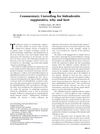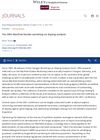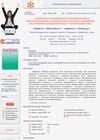 18 citations,
February 2001 in “Journal of International Medical Research”
18 citations,
February 2001 in “Journal of International Medical Research” Hairgain® significantly increased hair growth and was well-tolerated by individuals with hair loss.
 17 citations,
August 2010 in “Journal of the American Academy of Dermatology”
17 citations,
August 2010 in “Journal of the American Academy of Dermatology” Unroofing is an effective, less invasive, and cost-effective surgery for hidradenitis suppurativa with low recurrence and improved patient quality of life.
 16 citations,
November 2021 in “Antioxidants”
16 citations,
November 2021 in “Antioxidants” Managing oxidative stress might help treat low testosterone and related chronic diseases in aging men.
15 citations,
January 2016 in “International journal of trichology” Low vitamin D3 levels are significantly linked to hair loss, especially in female students.
 9 citations,
July 1995 in “Veterinary Clinics of North America: Small Animal Practice”
9 citations,
July 1995 in “Veterinary Clinics of North America: Small Animal Practice” The document concludes that hair loss in cats is caused by various factors, including allergies, mites, infections, and hormonal issues, with treatments varying accordingly.
 5 citations,
February 2014 in “PubMed”
5 citations,
February 2014 in “PubMed” Hair loss in Telogen effluvium is often chronic, linked to stress, and lacks a confirmed treatment, but topical corticosteroids may be used.
 3 citations,
December 2020 in “Polski merkuriusz lekarski : organ Polskiego Towarzystwa Lekarskiego”
3 citations,
December 2020 in “Polski merkuriusz lekarski : organ Polskiego Towarzystwa Lekarskiego” People with androgenetic alopecia often experience high stress, but the stress doesn't affect how the disease progresses or how well different treatments work.
3 citations,
May 2020 in “Journal of The Korean Medical Association” Minoxidil and finasteride are effective for treating hair loss, with dutasteride showing potential but with side effects.
 3 citations,
February 2020 in “International journal of women’s dermatology”
3 citations,
February 2020 in “International journal of women’s dermatology” Most women with hair loss take more supplements than average, but these often don't help and can be risky and costly.
 2 citations,
July 2023 in “Phytotherapy Research”
2 citations,
July 2023 in “Phytotherapy Research” Serenoa repens is mostly safe but has some risks, especially at high doses or when used with other products for over two weeks.
 2 citations,
January 2023 in “Journal of Dermatology”
2 citations,
January 2023 in “Journal of Dermatology” Some types of hair loss can continue for a long time after recovering from a severe drug reaction known as DRESS.
 2 citations,
July 2022 in “Cell Regeneration”
2 citations,
July 2022 in “Cell Regeneration” Understanding hair growth involves complex factors, and more research is needed to improve treatments for hair loss conditions.
 2 citations,
January 2020 in “International Journal of Medical Sciences”
2 citations,
January 2020 in “International Journal of Medical Sciences” Avoid alcohol, ponytails, and oily scalp, and get good sleep to prevent severe hair loss.
2 citations,
February 2001 in “PubMed” In Switzerland, 43% of men experience hair loss, and many switch to Propecia for treatment.
 1 citations,
November 2021 in “Drug Testing and Analysis”
1 citations,
November 2021 in “Drug Testing and Analysis” The 39th Manfred Donike Workshop discussed methods for detecting misuse of steroids, gene doping, and the complexity of identifying drug residues in urine, highlighting the ongoing efforts to improve global anti-doping work.
1 citations,
July 2021 in “IntechOpen eBooks” Environmental factors can cause mutations in skin proteins, leading to skin disorders.

The conclusion is that hair supplement ingredients may be unsafe and should be disclosed and proven safe before use.
 1 citations,
July 2018 in “Elsevier eBooks”
1 citations,
July 2018 in “Elsevier eBooks” Many treatments for hair loss show potential, but more testing is needed to confirm their effectiveness. Only minoxidil for women and minoxidil and finasteride for men are FDA approved.
 1 citations,
January 2006 in “Elsevier eBooks”
1 citations,
January 2006 in “Elsevier eBooks” Cats lose fur due to various reasons, including allergies, infections, genetics, hormones, diet, cancer, stress, and some conditions are treatable while others are not.
 September 2024 in “Journal Of Social Sciences And Humanites”
September 2024 in “Journal Of Social Sciences And Humanites” A combined approach of medical treatments, natural remedies, diet, and stress management is best for hair regrowth in Cambodia.
 August 2024 in “Nutrition Bulletin”
August 2024 in “Nutrition Bulletin” GLP-1 receptor agonists help with weight loss but need to be combined with other treatments for best results.
Supplements improve health, appearance, and athletic performance.
 April 2024 in “Remedium Journal about the Russian market of medicines and medical equipment”
April 2024 in “Remedium Journal about the Russian market of medicines and medical equipment” Pharmacy workers need more education to better help people with hair loss.
 November 2023 in “Curēus”
November 2023 in “Curēus” Eating junk food is linked to higher rates of PCOS and related symptoms in women.
 August 2023 in “Natural Resources for Human Health”
August 2023 in “Natural Resources for Human Health” Vegetarians should take B vitamin supplements to avoid health issues.

Vitamin D is crucial for skin health and managing skin diseases.
January 2022 in “Clinical Cases in Dermatology” Hypothyroidism can cause hair loss, which is often reversible with treatment.
June 2021 in “Current developments in nutrition” The LustrivaTM BH-002 supplement and hair serum improved women's hair, skin, and nail health and appearance.
 February 2020 in “International Journal of Advanced Research”
February 2020 in “International Journal of Advanced Research” The Garcinia Cambogia Nutri Bite could help manage PCOS symptoms.
 April 2019 in “Journal of Investigative Dermatology”
April 2019 in “Journal of Investigative Dermatology” Many patients with autoimmune blistering skin disorders change their diets, avoiding foods like alcohol, citrus, and spices, and some find vegetables and dairy helpful.























